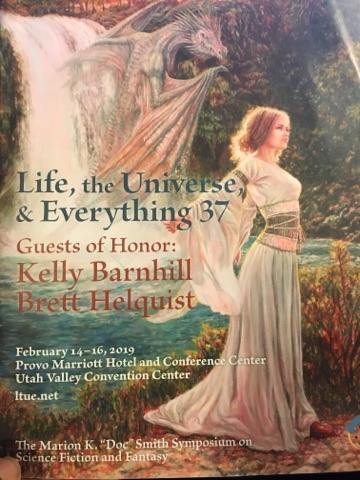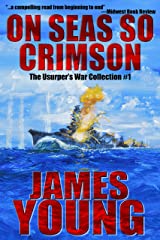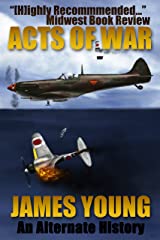So about a year ago, when I was talking to several of my fellow indie author friends, they mentioned a convention known as “LTUE.” When I asked what the acronym stood for, I was told, “Life, The Universe, and Everything.” Being familiar with conventions overselling and underperforming (and shamefully not recognizing the Hitchhiker’s Guide to the Galaxy quote), I merely nodded and made a note that the event existed. I mean, surely a convention full of writers couldn’t be really that good. Plus, as long-time readers of this blog know, I go to cons to fleece people, erm, I mean, give them products in exchange for money.
Hi, my name is James, and I’d like to talk about why you shouldn’t be as idiotic as I was.
BLUF: LTUE isn’t a seller con, it’s a professional one. (Although, there was a dealer room and I did get my wife a really nice dice bag from Words & Geekery, a local small business.) If you are an indie author, you should go expecting to have knowledge poured into your head by people who are quite knowledgeable in their field. You should also go expecting to hear diverse points of view. Finally, you should attend to reconnect with old friends, make new ones, and quite possibly end up dragooned into moderating / guesting on multiple panels. Like, oh, nine or so of them.
If you’re looking for a blow by blow AAR, friend and fellow indie Cedar Sanderson is starting a really good one here [EDIT: and the rest of it here]. I’ll simply give some background and hit the highlights of my attendance, but Cedar captures the nuts and bolts of what it was like day to day. I will say that there were Belgian Waffles:
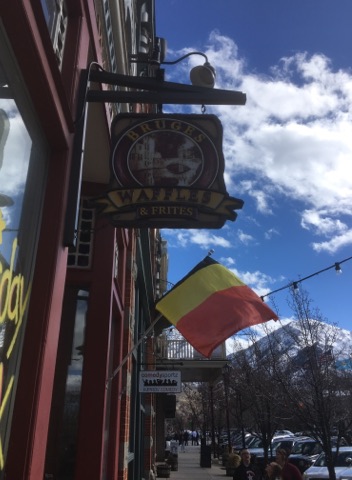
Stores that made me wonder if the Mortal Kombat crew had fallen on hard times:
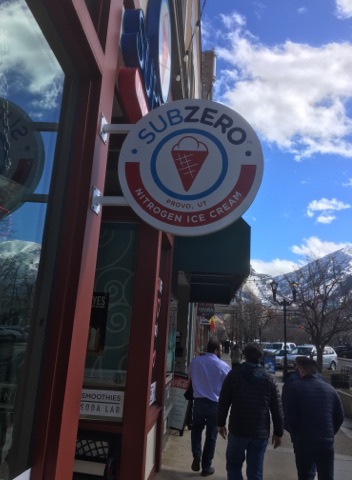
And my favorite, traps, erm, I mean, hazards:
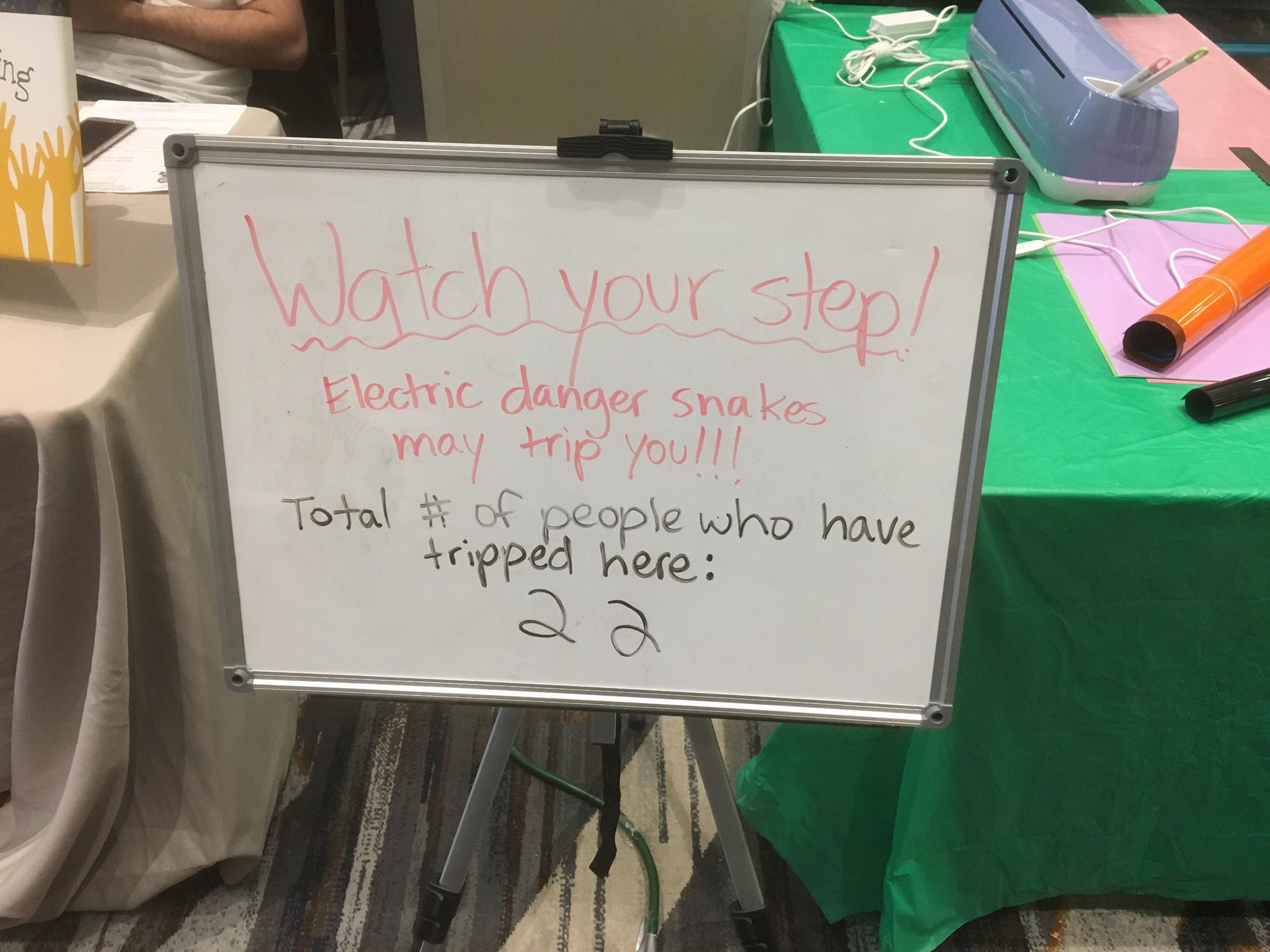
LTUE used to be held at BYU, but outgrew the college and was held at the Provos Marriott. Inprocessing was pretty easy, especially as originally I wasn’t planning on presenting. Indeed, I specifically said to my friends that I was coming “as an innocent bystander,” i.e., just some rando guy who happened to know people until I got the feel of the convention. This is standard for me (several of my friends are laughing right now), as it’s a lot easier to get a good feel for things if one grabs a seat in the corner of a room and just listens. However, I greatly underestimated the number of Libertycon alumni who would not only be attending, but were quite happy to dime me out as knowledgeable history and military subjects. When the head of the con walked up and said, “Oh, you’re Dr. James Young, I’ve heard so much about you”, I kind of knew my [albeit flimsy] cover had been blown. Hilarity ensued from that point on, especially when I may or may not have heckled fellow author Kal Spriggs. I pretty much stood in for my friend and fellow indie Peter Grant (who ended up having to cancel at the last minute) as well as another author/presenter who just flat out didn’t show up.
This leads well to another discussion that is very pertinent not only to LTUE but conventions in general: If you’re ever asked to present, moderate, or be a panelists at a conference, the most important thing to do is show up. If unable to do the most important thing, it is incumbent that you let not only the convention organizers but your fellow panelists know that you will not make it. I will merely say that missing three days of a panels with nary a word to folks who expected you to be on panels is a great way to get a reputation as a jerk. Stiff people like that, you better be able to say, “Well, there was that little matter of me nearly dying…” or “Look, I didn’t know my first cousin owed the cartels money and they were going to kidnap me to make my grandma pay up.”
On the other hand, being able to discuss a topic coherently, even with no warning, is a good skill to cultivate as an author. Furthermore, seizing the opportunity to either moderate or be on a panel will, apparently, get one kudos for an entire weekend as well as a reputation. Finally, being on panels is a great way to meet other subject matter experts in your field.
Even more fun than being on panels, however, was attending several (list at the bottom of the post). I learned a lot about prison guards, artist networking, The Cuban Missile Crisis, and various other sundry subjects than I had expected. A panel on death and dying provided by a good friend who is also a hospice nurse not only gave me a story idea but also helped me reconsider my own blind spots and how I dealt with terminal disease in some books. There was a panel in which I learned new ways to assess gender and power relationships in both reading and writing. Lastly, I got to meet one of my favorite alternate history authors by total and complete accident.
That last one deserves its own paragraph. When Angels Wept is an alternate history of the Cuban Missile Crisis done by Dr. Eric Swedin that won the 2010 Sidewise Award. Having only met Eric the night before, I did not put his name and the book together when I started talking to another individual about the book. That person pointed out that Eric had given him a copy, at which point I said, “You gave him a great book.” To which Eric replied nonchalantly, “I know, I wrote it.” After a moment of fanboying, I pointed out that at least he knew I honestly liked it and wasn’t just being polite. (Why yes, next year I do intend to take my copy to have him sign it. Why do you ask?) However, bonus points: I was also able to recruit Eric for To Slip the Surly Bonds, the next Phases of Mars alternate history anthology which will focus on air combat.
In the end, it was this face-to-face interaction that was LTUE’s best aspect. There are only a few cons where several New York Times bestselling authors and illustrators (to include Brett Helquist, who is simply amazing with his advice and knowledge) are not only in attendance, but also happy to share their experiences at length. This by itself makes LTUE worth its low price of admission ($55) and the trip out there. Add in the fact you get to test new plot outlining technology and have a chance to talk with experienced editors looking for clients, and it’s almost stealing. If you’re an indie author, especially west of the Rockies, LTUE should definitely be on the list of cons to attend at least once.
List of panels where I was either the moderator or a panelist (so you can find them if LTUE puts them on YouTube):
“Joining the Rebellion”—Moderated
“Chesney to Heinlein to Weber: The Evolution of Military SF”
“Rules of Engagement”
“Heinlein and the Battlefield: Starship Troopers’ Influence on the Military”—Moderated
“The Art of War 1 and 2”—This was a double panel
List of panels I attended:
“On Death and Dying: Watching Over the Terminally Ill”—As noted above, this was done by my friend, and hospice nurse, Amanda Fuesting. Amanda rocked it, and if you’re ever around for her doing a repeat, go. Not just as an author, but as someone who will likely end up with someone close to you being terminally ill.
“Book Cover Design and Layout”
“Prisoners and Prison Guards”
“Writing a Diverse Cast Without Stereotyping”
“Hacking in Fiction” –Henceforth known as the one in which I’m pretty sure the attendees watched a young woman embrace a path to super villainy because she “had student loans to pay.”)
“Making a Living Through Art”
“Feminism and Intersectionality in SFF”
“Networking for Artists”
“Realistic Self-Publishing: What It Takes to Make It in the World of Self-Publishing”—This is a must see if it makes it to the YouTube channel. Ms. Keary Taylor did an excellent job of laying out the path to success for a new indie author.
“The Cuban Missile Crisis”
“Working With a Cover Artist”—This one was an interesting juxtaposition on how covers are approached by small press, indies, and traditional publishing. There was one point where Cedar, seeing my gnashing my tongue to ribbons, tried to get me to say what I was thinking. Ha ha ha…no. 😀
A note on getting there: I chose to drive out to Provos from the Fortress of Despair due to the fact I hate flying and it’s kind of hard to bring books on an airplane. [“Wait, I thought you said this wasn’t a selling con!” It wasn’t—doesn’t mean I was going without product. Please.] A couple of my West Point classmates graciously let me crash at their place (Thanks Shannon and Joe! Baby goats!) on the way out, so I decided to take I-80 across Wyoming and Utah. It was a pretty scenic drive despite high winds in Utah and a snowstorm that went from “Oh, it will be a light dusting…”-forecast to “Yep, Frosty the Snowman found out about your affair with his wife and is coming for your soul…”-actuality. Bonus? Got to drop in and see the guys at Die Hard Dice, a regular supplier of accessories for my and Anita C. Young’s DnD habit.
On the way back east, I drove I-70, and that’s probably not happening again anytime soon. *shudder* Something about being higher than the majority of aerial combat over the Eastern Front in World War II was unsettling.

The skiers returning to Denver from the slopes didn’t help my mood either. Add in yet another snowstorm, and I think I’ll take the wide open spaces of Wyoming over choked mountain passes any day of the week.

Still, driving was definitely the way to go if you’re attending the con. I came back with lots of goodies and business cards, plus stopped and saw friends along the way.

